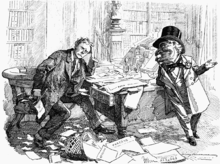Court of Criminal Appeal
The Court of Criminal Appeal is the name of an existing court of Scottish law and of historic courts in England and Wales, Ireland, and Northern Ireland.
England and Wales

Mr. P. (sympathetically). "Why, indeed? But I don't see any Help for it till we get a Court of Criminal Appeal."
---- Punch magazine cartoon from 1890, noting then current discussion as to the need to relieve the Home Secretary of the responsibility for determining criminal case appeals.
The Court of Criminal Appeal was an English appellate court for criminal cases established by the Criminal Appeal Act 1907.[1] It superseded the Court for Crown Cases Reserved to which referral had been solely discretionary and which could only consider points of law. Throughout the nineteenth century, there had been opposition from lawyers, judges and the Home Office against such an appeal court with collateral right of appeal. However, disquiet over the convictions of Adolf Beck and George Edalji led to the concession of a new court that could hear matters of law, fact or mixed law and fact.[2]
Though the court was staffed with the judges who had shown such hostility (consisting of the Lord Chief Justice and eight judges of the Queen's Bench Division of the High Court), it had a restraining effect on the excesses of prosecutors. During the period 1909–1912, there was an average of 450 annual applications for leave to appeal of which an average of 170 were granted. Of that 170, conviction was quashed in 20 percent of cases and sentence varied in another 22 per cent. Rulings of the court included limitation of the lower courts' ability simultaneously to try multiple defendants, multiple indictments and disparate counts within an indictment. The ability of the prosecution to introduce further evidence after the close of the prosecution case was curtailed as were several prejudicial practices with a defendant's previous criminal record. Further, trial judges' ability to invade the jury's role as trier of fact came under scrutiny, as did the practice of insisting that the defence proceed even in the case of an inadequate prima facie case by the prosecution. The Court also did much to refine and systematise the law of evidence.[3][4]
On 1 October 1966, the Court of Criminal Appeal was superseded by the Criminal Division of the Court of Appeal of England and Wales.[5][6]
Scotland
Following the Criminal Appeal (Scotland) Act 1926 (16 & 17 Geo. V), when the Scottish High Court of Justiciary hears criminal appeals, it is known as the Court of Criminal Appeal. The Criminal Appeal (Scotland) Act 1927 was passed the following year specifically to deal with the Case of Oscar Slater.
The court consists of at least three judges when hearing appeals against conviction and two when hearing appeals against sentence, although more judges may sit when the court is dealing with exceptionally difficult cases or those where important matters of law may be considered. This is known as a Full Bench. Appeals are heard from the High Court of Justiciary, the Sheriff Courts and the District Courts. The High Court also hears appeals in cases referred to it by the Scottish Criminal Cases Review Commission.[7]
Northern Ireland
A Court of Criminal Appeal in Northern Ireland was established on the model of the English Court by the Criminal Appeal (Northern Ireland) Act 1930, and replaced by a general Court of Appeal by the Judicature (Northern Ireland) Act 1978.[8]
Ireland
The Courts of Justice Act 1924 passed after the 1922 Constitution of the Irish Free State established a Court of Criminal Appeal. Until 2014, the Court of Criminal Appeal heard cases which have been appealed from the Circuit Court, Central Criminal Court and Special Criminal Court. It was made up of three judges and has a majority decision. Leave to appeal was only given where there was a disagreement on a point of law, although an exception can be made when new evidence becomes available which could not have been presented before the original court. After a 2013 amendment to the 1937 Constitution of Ireland, the Court of Criminal Appeal was superseded by a new Court of Appeal, which is not limited to criminal law cases.
References
- ↑ 7 Edw. VII, c.23
- ↑ Cornish & Clarke (1989) p.619
- ↑ Cornish & Clarke (1989) p.620
- ↑ Davies (1949)
- ↑ Criminal Appeal Act 1966
- ↑ Lord Mackay of Clashfern (ed.) (2002) Halsbury's Laws of England, 4th ed. Vol.10 (Reissue), "Courts", 634 'Divisions of the Court of Appeal'
- ↑ Scottish Court Service website
- ↑ Stannard, John E. (2013-02-28). "The View From Ireland". In Bohlander, Professor Michael; Reed, Professor Alan. Loss of Control and Diminished Responsibility: Domestic, Comparative and International Perspectives. Ashgate Publishing, Ltd. p. 153. ISBN 9781409497820. Retrieved 27 December 2014.
Bibliography
- Cornish, W.; Clarke, G. (1989). Law and Society in England 1750-1950. London: Sweet & Maxwell. pp. 619–623. ISBN 0-421-31150-9.
- Davies, S. (1949) Journal of the Society of Public Teachers of Law (new series) 425